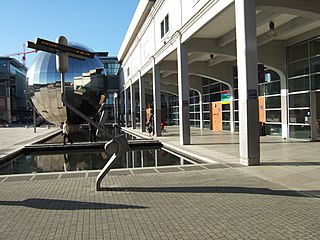
The University of Regina is a public research university located in Regina, Saskatchewan, Canada. Founded in 1911 as a private denominational high school of the Methodist Church of Canada, it began an association with the University of Saskatchewan as a junior college in 1925, and was disaffiliated by the Church and fully ceded to the university in 1934; in 1961 it attained degree-granting status as the Regina Campus of the University of Saskatchewan. It became an autonomous university in 1974. The University of Regina has an enrolment of over 15,000 full and part-time students. The university's student newspaper, The Carillon, is a member of CUP.
Johannes Birringer is an independent media choreographer and artistic director of AlienNation Co., a multimedia ensemble that has collaborated on various site-specific and cross-cultural performance and installation projects since 1993. He lives and works in Houston and London.

We The Curious is a science and arts centre and educational charity in Bristol, England. It features over 250 interactive exhibits over two floors, and members of the public and school groups can also engage with the Live Science Team over programming in the kitchen, studio and on live lab. We The Curious is also home of the United Kingdom's first 3D planetarium. The centre describes its aim as being "to create a culture of curiosity".
STEIM was a center for research and development of new musical instruments in the electronic performing arts, located in Amsterdam, Netherlands. Beginning in the 1970's, STEIM became known as a pioneering center for electronic music, where the specific context of electronic music was always strongly related to the physical and direct actions of a musician. In this tradition, STEIM supported artists in residence such as composers and performers, but also multimedia and video artists, helping them to develop setups which allowed for bespoke improvisation and performance with individually designed technology.

The University of Cincinnati College-Conservatory of Music (CCM) is a performing and media arts college of the University of Cincinnati in Cincinnati, Ohio. Initially established as the Cincinnati Conservatory of Music in 1867, CCM is one of the oldest continually operating conservatories in the US.

Tracy Fullerton is an American game designer, educator and writer, best known for Walden, a game (2017). She is a Professor in the USC Interactive Media & Games Division of the USC School of Cinematic Arts and Director of the Game Innovation Lab at USC.

Wiltshire College & University Centre is a tertiary college of education founded in 2002 by the merger of Chippenham Technical College, Lackham College and Trowbridge College. Consolidation was completed with the merger of Salisbury College, which commenced in January 2008. In 2020-21 the institution offered over 1,000 courses and had approximately 3,300 full-time and 6,000 part-time students, with over 800 enrolled on degree-level courses.
Live electronic music is a form of music that can include traditional electronic sound-generating devices, modified electric musical instruments, hacked sound generating technologies, and computers. Initially the practice developed in reaction to sound-based composition for fixed media such as musique concrète, electronic music and early computer music. Musical improvisation often plays a large role in the performance of this music. The timbres of various sounds may be transformed extensively using devices such as amplifiers, filters, ring modulators and other forms of circuitry. Real-time generation and manipulation of audio using live coding is now commonplace.
A networked music performance or network musical performance is a real-time interaction over a computer network that enables musicians in different locations to perform as if they were in the same room. These interactions can include performances, rehearsals, improvisation or jamming sessions, and situations for learning such as master classes. Participants may be connected by "high fidelity multichannel audio and video links" as well as MIDI data connections and specialized collaborative software tools. While not intended to be a replacement for traditional live stage performance, networked music performance supports musical interaction when co-presence is not possible and allows for novel forms of music expression. Remote audience members and possibly a conductor may also participate.

Dana Reason is a Canadian composer, recording artist, keyboardist, producer, arranger, and sound artist working at the intersections of contemporary musical genres and intermedia practices.

Jon McKenzie is a performance theorist, media maker, and transdisciplinary researcher and teacher at Cornell University. He is founder of the StudioLab pedagogy and former director of DesignLab at the University of Wisconsin-Madison. McKenzie's main interests are in new media, performance theory, and the role of art and technology in cultural research, contemporary processes of globalization, and emerging forms of social activism.
Annabeth Robinson, whose online Second Life alias is AngryBeth Shortbread, is a multi-media artist and lecturer based in Leeds, UK where she focusses on the teaching of audio, visual and online technologies. Using Second Life and other Multi User Virtual Environments (MUVEs), Robinson explores their potential as a medium for art and design practice whilst examining its educational potential. Robinson has been undertaking such projects since 2005.
Erin Manning is a Canadian cultural theorist and political philosopher as well as a practicing artist in the areas of dance, fabric design, and interactive installation. Manning's research spans the fields of art, political theory, and philosophy. She received her Ph.D in Political Philosophy from University of Hawaii in 2000. She currently teaches in the Concordia University Fine Arts Faculty.

Katerina Cizek is a Canadian documentary director and a pioneer in digital documentaries. She is the Artistic Director, Co-Founder and Executive Producer of the Co-Creation Studio at MIT Open Documentary Lab.
Interactive Futures (IF) was a biennial conference and exhibition, hosted in Vancouver, British Columbia, Canada, that explored current tendencies, research and dialogue related to the intersection of technology and art. Interactive Futures included a variety of events such as lectures, workshops, exhibitions, and panels in an effort to provide opportunities for discourse by local, national and international researchers and practitioners.

Beth Coleman is an American female electronic music composer and academic in the field of new media studies. Her work has been featured in a variety of venues such as the Whitney Museum of American Art, MoMA PS1, Musée D'art Moderne Paris, and the Waag Society Amsterdam. From 2005 until 2011, she was a professor of Comparative Media Studies and Writing at Massachusetts Institute of Technology. Currently she is assistant professor, Department of English Language and Literature, University of Waterloo, Canada, and co-director of Waterloo's Critical Media Lab.

MTF Labs is a series of innovation labs, festivals and events encouraging innovation through creative work, particularly music.
Lalya Gaye is a digital media artist and interaction designer whose early work was influential in the field of locative media. Currently based in Newcastle upon Tyne, UK, she is the founder and director of the international and interdisciplinary digital art practice Attaya Projects.
Kathy Rae Huffman is an American curator, writer, producer, researcher, lecturer and expert for video and media art. Since the early 1980s, Huffman is said to have helped establish video and new media art, online and interactive art, installation and performance art in the visual arts world. She has curated, written about, and coordinated events for numerous international art institutes, consulted and juried for festivals and alternative arts organisations. Huffman not only introduced video and digital computer art to museum exhibitions, she also pioneered tirelessly to bring television channels and video artists together, in order to show video artworks on TV. From the early 1990s until 2014, Huffman was based in Europe, and embraced early net art and interactive online environments, a curatorial practice that continues. In 1997, she co-founded the Faces mailing list and online community for women working with art, gender and technology. Till today, Huffman is working in the US, in Canada and in Europe.

Artisans Asylum is a non-profit community workshop in Allston, Massachusetts. Artisans Asylum was founded in 2010 by an engineer, an artist, and friends who needed an affordable place to build and make things. Artisans was the first makerspace to incorporate in the U.S. in 2012 and today is 40,000 square feet of fabrication space.












